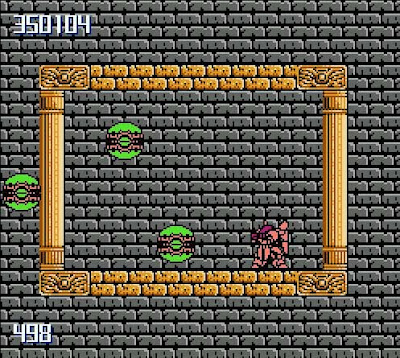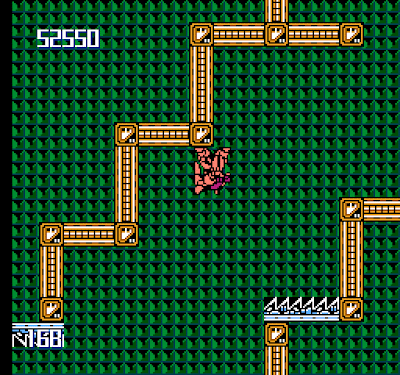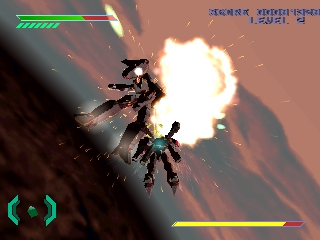 |
| North American cover art |
Release: 1991
Developer: Tamtax
Publisher: Irem
Genres: platformer, action, run n' gun, mecha, Nintendo
This is the first non-Playstation game I'll be covering! And what a treat we have today. Good old Metal Storm for the Nintendo Entertainment System. Released in 1991, it's a side-scroller action platformer where you play as a cute little mech! In the 26th century, humans have built a giant laser gun operated by robots to protect Earth from any alien invaders. However, the gun has malfunctioned and has begun blowing up entire planets! Any attempts to shut down the weapon have failed and now humanity has resorted to sending in a fighter, the M-308 Gunner, to manually activate the system's self destruct switch. That is where the player comes in, as they must travel through 7 challenging stages to save the human race!
 |
| The box art show's a mech in white, however in the game it is actually a pinkish tone instead. It was changed to white for the Japanese release, though. |
As already mentioned, Metal Storm is a platformer action run n' gun. Your mech is equipped with a trusty pea shooter gun, and can shoot in all cardinal directions, as well as jump and crouch to avoid enemies and enemy fire. There's several power-ups that can be found throughout the game, such as items that powerup your weapon, shields, and even bombs that when touched kill all enemies on screen. However, the most interesting thing about Metal Storm's gameplay is the gravity switching mechanic. Essentially, by pressing up on the d-pad and jump at the same time, the M-308 can reverse it's gravity, and essentially walk on the ceiling. The mech still moves and behaves the same way, and can move back and forth at will. Simultaneously though some enemies also switch gravity so you have to be careful. This is the draw of the game, and it's essential to master it in order to get anywhere.
Because of this, the levels are all designed to create new challenges or obstacles to work around this mechanic. Stage 2 for example "loops" indefinitely scrolling up and down, confusing the player, so some serious thinking is required to figure out exactly which way to proceed. Other common obstacles throughout are lasers or switches that can only be deactivated while standing upright or upside down. Because of these, the game is practically a pseudo-puzzle game. Stage 4 is quite interesting; the M-308 is stuck in a small box that scrolls throughout the level, and at the same time, enemies come flying at you, obstacles require you to move quickly, and force fields can severely limit the space you have. It's a tough stage to learn but it's probably the funnest stage in the whole game for this reason. Stage 6 is similar to stage 2, in that the screen infinitely loops up and down, and the gunner can go out one side of the screen and come out the other, all while trying to move forward and not die. It really confuses the player as you never truly know which way is "up". Naturally, each stage finishes with a boss fight. Like the scrolling stages, the bosses are well thought out. Some require to switch gravity back and forth and move across the screen, like the first stage boss, as it's only weak spots are at points that you can only access by reversing gravity. Some bosses are downright insane, such as one that involves destroying platforms while in a room with constantly rotating platforms (the same platforms you are trying to destroy!) with only spikes for a floor that insta-kill you. Another great battle is one that changes form and alters its attack for each formation, causing you to have to change your gravity on the fly. There is also a powerup that turns you invincible and does damage to any enemies whenever you are switching gravity, so that does help. The level design is arguably the highlight of the game, as each level regularly keeps you on your toes and throws a curveball at you everytime. Some games since then have used a similar mechanic, such as VVVVV, but Metal Storm's is so fun to use, especially because something that seems like it could be complicated is actually very easy to control.
 |
| The "box" stage. |
It can go without saying, but this game is still very tough. Irem is notorious for games that have brutal, unforgiving difficulties like R-Type or Holy Diver, but Metal Storm isn't quite as hard as those ones. Your gunner dies in only one hit, but you do get unlimited continues, and there's even a password system in case you need to shut off the game. Don't let that fool you though; it's still a bitch to master as most of the difficulty comes from learning the levels and patterns, or figuring out which path is the best to take.
 |
| Transforming boss. |
As far as looks go, Metal Storm is gorgeous for an Nintendo game. Levels are usually pretty colorful and most even have parallax scrolling, which is very rare to see in a NES game. The M-308's animations are very smooth and advanced, and so are the enemies and bosses. Though due to too many things on screen sometimes, there can still be considerable slowdown and flickering. The music is about average; it sounds fine but nothing super memorable. The first stage music is actually pretty upbeat, for a game that has a rather serious, cold tone.
There are 6 stages at first, and after beating these you move on to the final one, which is just a boss rush of all the bosses you've already beat. After this, you simply shoot at a gun without much threats while a countdown timer closes to 0. Destroy the core in time and you complete the game. Pretty anti-climatic for saving all of humanity. That's probably one of the downsides of the title, it's rather short and doesn't have a whole lot of replayability. Upon beating it the first time around, you are given a password that restarts the game on a higher difficulty; enemies are stronger and move much faster. Playing on the harder difficulty really makes it feel much more like a typical Irem game.
Sadly, this gem faded into obscurity. The most coverage it ever got was appearing on the cover of Nintendo Power #22, which included a 12 page guide for the game. Despite this, the game recieved little attention and sold poorly, which is too bad, it's a very good game worth playing. I'm not super into NES anymore, but this is absolutely one of my favourites, definitely in my top 5 NES games. It's one I still go back to every once in a while. It might be best to emulate this one or play it off a flashcart; naturally, because it was a late release on the system and it sold poorly, original copies command a hefty pricetag. Be prepared to spend around $150 for just a loose copy of the game. However, the game does have a small following online and in 2019 Retro-bit officially re-released the game with reproduction copies of the game, coming in a cool white shell. So there is some hope for this little guy.
 |
| Nintendo Power #22 cover. |
 |
| Cool artwork inside. |
 |
| Retro-bit re-release cartridge. |
One little thing with this game: Here's a most excellent poster I have of the game from Nintendo Power. I believe it's from the same issue mentioned earlier. It would have been a foldout poster that used to come with every issue of the magazine. It measures about 11" x 23". I found this at AnimeNorth 2019 when I went. I caught a glimpse of the logo from the corner of my eye at a vendors booth, and was immediately tempted. The guy sold it to me half off too. Just like that, it was mine. It was the final day of the convention so I guess by this point he was desperate to sell anything. It's a great find because I was looking to get some sort of poster, anime, games, whatever but this was way too cool to pass up. It now hangs near our games shelf and makes for some nice little artwork. The gunner is in fact a real 3D model that was mocked up for the photo, (I don't think it's the same one as on the magazine cover, so they must have made at least 2) however it's not as detailed as it is in the official game artwork. I wonder if those models still exist somewhere, possibly stowed away in an employee's closet or attic. I would love to have one of those. Metal Storm model kit when???



















